entrepreneurs
John Baskerville
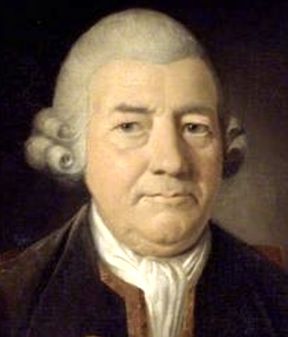
On this date in 1706, John Baskerville was born in Wolverley, Worcestershire, England. At age 17 he was engraving tombstones and at 20 started an engraving business. At 32 he took up the then-popular lacquering process known as japanning that made him wealthy. Baskerville was an early mentor to Matthew Boulton, who built Watt’s steam engines. He was also a good friend of fellow printer Benjamin Franklin, who visited him when he was U.S. ambassador to France.
In his early 40s he started applying his engraving skills to printing and typography and produced the first of the Baskerville fonts. Cambridge University Press hired him as its printer and there, in 1763, he printed his great masterpiece: “After five years’ labor, he produced what might have been the most beautiful Bible yet made,” wrote John H. Lienhard, University of Houston emeritus professor of engineering and history. “The contradiction was that Baskerville was an atheist! And he was no closet unbeliever. He was an outspoken iconoclast.”
Francis O’Regan of the Birmingham (UK) Skeptics isn’t so sure, writing in June 2011: “There is no doubt he was Anti-clerical and he obviously had little respect for revealed religion but those confirmed facts don’t necessarily support the idea he was an Atheist. It is just as likely that he was a Deist like his beloved Voltaire.”
He instructed that he wished to be buried in unconsecrated ground and composed his own freethinking epitaph. By interesting coincidence, the typeface used for many years by FFRF’s publication Freethought Today is Baskerville Times. (D. 1775)
Stranger
Beneath this cone in unconsecrated ground
a friend to the liberties of mankind
directed his body to be inhumed.
May the example contribute to emancipate thy mind
from the idle fears and superstitions
and wicked arts of priesthood.— Baskerville's self-composed tombstone inscription (1775)
Thomas Alva Edison
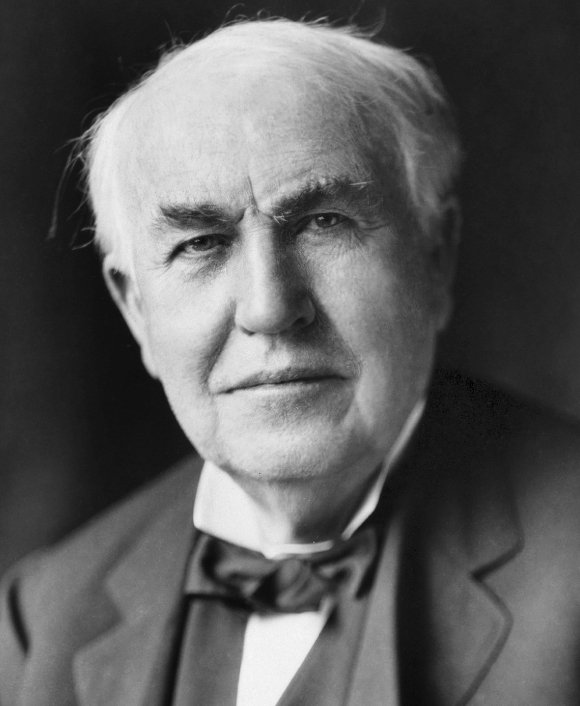
On this date in 1847, Thomas Alva Edison was born in Ohio, the youngest of seven. The inventor, who came to be known as “the Wizard of Menlo Park,” read Gibbon’s Decline and Fall of the Roman Empire before the age of 10 and vowed at age 12 to read the entire contents of the Detroit Public Library, was largely self-taught. Supporting himself at a very early age, Edison sold newspapers, worked for railroad companies and became a telegraph operator.
He invented the commercially viable, long-lasting incandescent bulb, the phonograph, motion picture camera and improved the telegraph and telephone, becoming a highly successful businessman and manufacturer. Edison, who held more than 1,300 U.S. and foreign patents, famously noted: “Genius is one percent inspiration and ninety-nine percent perspiration.”
He was a lifelong freethinker who in his 1925 essay “The Philosophy of Paine” called Thomas Paine “our greatest political thinker.”
“I cannot believe in the immortality of the soul,” he told The New York Times. (Oct. 2, 1910) “Heaven? Shall I, if I am good and earn reward, go to heaven when I die? No — no. … I am an aggregate of cells, as, for instance, New York City is an aggregate of individuals. Will New York City go to heaven?” (D. 1931)
“Nature is what we know. We do not know the gods of religions. And nature is not kind, or merciful, or loving. If God made me — the fabled God of the three qualities of which I spoke: mercy, kindness, love — He also made the fish I catch and eat. And where do His mercy, kindness, and love for that fish come in? No; nature made us — nature did it all — not the gods of the religions.”
— New York Times interview, " 'No Immortality of the Soul' Says Thomas A. Edison" (Oct. 2, 1910)
Nell Newman
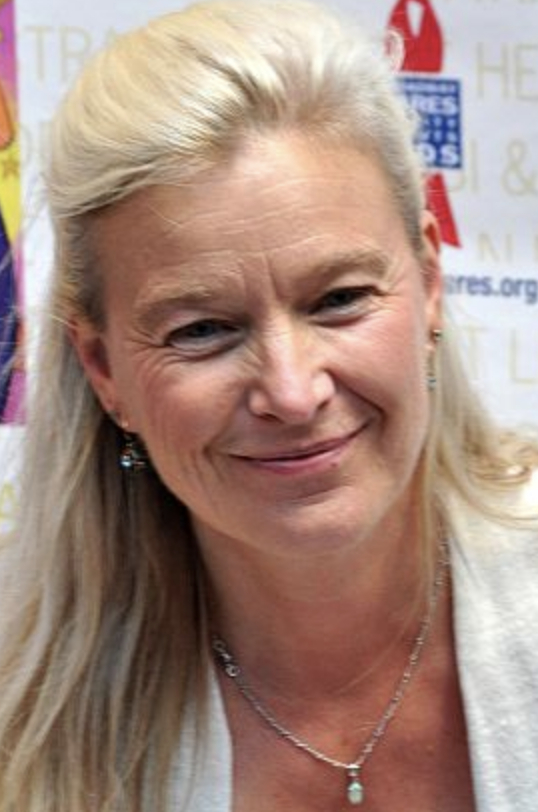
On this date in 1959, environmentalist, entrepreneur and philanthropist Elinor Teresa “Nell” Newman was born in New York City to actors Joanne Woodward and Paul Newman. She worked as a child actor under the name Nell Potts. She attended Putney School, a high school in Vermont established to spread progressive education, and earned a B.S. in human ecology at the College of Atlantic in Bar Harbor, Maine. Newman moved to California, where she served as the executive director of the Ventana Wilderness Sanctuary as well as the development director for the Santa Cruz Predatory Bird Research Group.
She worked for fundraising institutions until 1993. Her commitment to health and sustainable agriculture led her to convince her father to let her establish Newman’s Own Organics: The Second Generation as an organic division of his Newman’s Own line. Her first snack creation, Newman’s Own Organic pretzels, became the number-one food snack in America in its first year of production. She has created over 100 organic food products and compiled her thoughts about how to make a difference in life in her 2003 book The Newman’s Own Organics Guide to a Good Life: Simple Measures That Benefit You and the Place You Live.
In 2010 she started the Nell Newman Foundation, which awards grants in these core areas: environment, education, arts and culture, spiritual, scientific, human services, emergency relief, animal welfare and international affairs. The foundation “stands in solidarity with Black Lives Matter and seeks to further equity and social justice through its grant making.”
Newman is an admirer of freethinkers Walt Whitman and Edward Abbey, citing Abbey’s 1968 autobiographical “Desert Solitaire” as “very special to me.” (Life Productions, March 5, 2020) She received the Rachel Carson Award in 2014 from the National Audubon Society for her environmental leadership and was inducted into the Specialty Food Association’s Hall of Fame in 2017 and the Connecticut Women’s Hall of Fame in 2019.
She married Gary Irving, a native of Wales, in 2005 in California. They met when Newman bought a surfboard at Irving’s store. Julie Norris of the British Humanist Association conducted the service.
PHOTO: Newman at the 2011 Broadway Barks pet rescue benefit in New York City; Nick Step photo under CC 2.0.
“This is what you shall do: Love the earth and sun and the animals, despise riches, give alms to every one that asks, stand up for the stupid and crazy, devote your income and labor to others, hate tyrants, argue not concerning God, have patience and indulgence toward the people, take off your hat to nothing known or unknown or to any man or number of men …”
— Walt Whitman quote included on the Nell Newman Foundation's "Welcome" page
Hugh Hefner
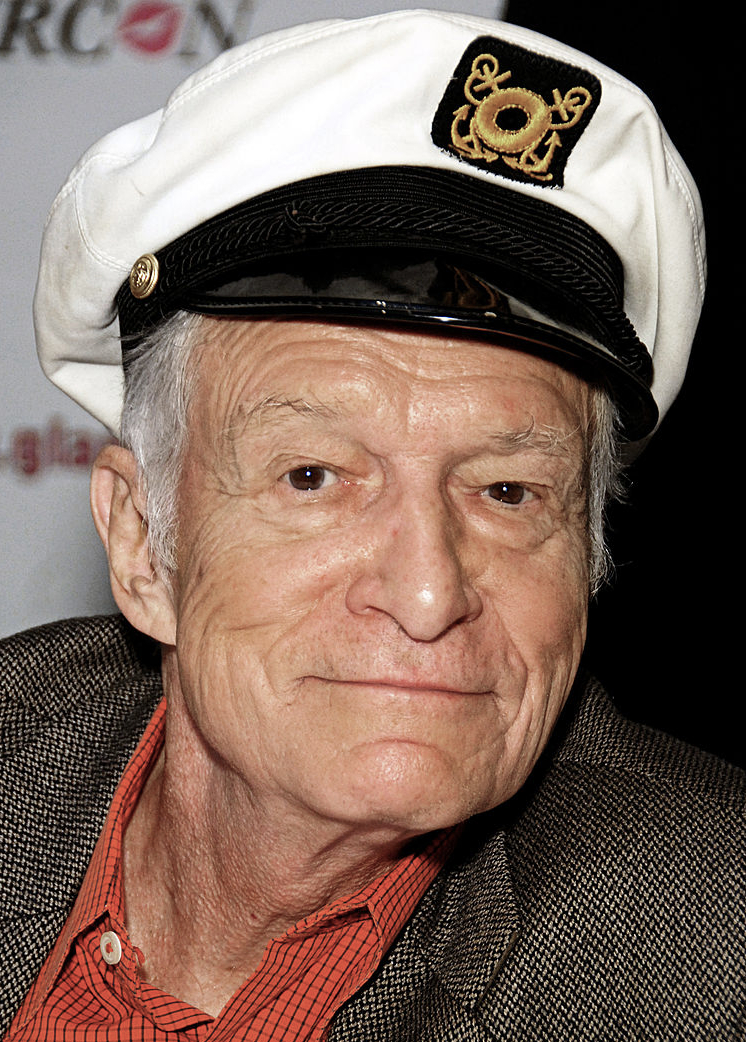
On this date in 1926, Playboy mogul Hugh Marston Hefner was born in Chicago, the firstborn of Grace and Glenn Hefner’s two sons. His parents were strict Methodists. He went to school in the city and started a school newspaper at Steinmetz High School. He served in the U.S. Army during World War II. After discharge in 1946, he studied at the Chicago Art Institute for two years and then at the University of Illinois at Urbana-Champaign, completing a degree in psychology in 1950.
After college he began working as a promotional copywriter at Esquire in Chicago, which was then the premier men’s magazine. After three years he left in frustration, determined to start his own publication. With $8,000 from 45 investors, Hefner started Playboy magazine. The first issue was published in December 1953. It was an instant success, selling 50,000 copies. By 1959 Playboy was selling almost a million copies a month and Hefner was expanding his success. Playboy Enterprises established private key clubs, staffed with the iconic “bunnies” as hostesses, high-end resorts and modeling agencies. There were books and films and two television series. By 1970 the publication was selling 7 million copies a month.
After suffering a minor stroke in 1985, Hefner largely stepped back from Playboy Enterprises, leaving his daughter, Christie Hefner, at the helm. He instead focused on philanthropic efforts, making a few notable TV and film appearances to continue promoting the Playboy brand. He championed the issues of free speech and freedom of the press. He established the Playboy Foundation in 1965 to provide grants to nonprofits fighting censorship or researching human sexuality. The foundation also sponsors the Freedom of Expression Award, which is given at Sundance Film Festival every year.
While Playboy became a byword for objectification of women, with Gloria Steinem writing a famed piece, “A Bunny’s Tale,” for Show magazine on May 1, 1963, exposing what it was like to be a “Bunny,” Hefner placated some feminist critics by defending women’s reproductive rights. The A&E network’s 12-part miniseries titled “Secrets of Playboy” started airing in early 2022. Directed by Alexandra Dean, it reexamined Hefner and Playboy Enterprises through the lens of 2022 and in the wake of #MeToo. Dozens of women appear in the documentary to allege decades of sexual predation, including rape, and extensive use of illegal drugs and secret recordings inside the Playboy Mansion in the Holmby Hills neighborhood of Los Angeles.
In response, an open letter signed by about 500 people defended Hefner, calling the allegations unfounded: “From all we know of Hef, he was a person of upstanding character, exceptional kindness, and dedication to free thought.” In a statement, the company said “today’s Playboy is not Hugh Hefner’s Playboy. We trust and validate these women and their stories and we strongly support those individuals who have come forward to share their experiences.”
Alexandra Dean: “His progressive reputation was like a shield that stopped a lot of these allegations from touching him. It was just too hard to believe that this guy who was always promoting women at his company and was a progressive champion, how could he secretly be attacking women behind closed doors?” (Variety, Feb. 7, 2022) “That other side of Hugh Hefner really does need to have a reckoning now — we need to figure out how to reconcile the two Hugh Hefners and now decide what his real legacy is.”
Hefner married three times: to Mildred Williams (1949), Kimberley Conrad (1989) and Crystal Harris (2012). He also lived with a succession of younger “partners” at the mansion. He was 86 when he married Harris, a 26-year-old former Playmate. He had a son and a daughter with Williams and two sons with Conrad. He died at the mansion at age 91 of cardiac arrest and was interred in a mausoleum drawer next to Marilyn Monroe in Westwood Memorial Park. (D. 2017)
PHOTO: Hefner in 2010; Glenn Francis photo under CC 3.0.
“It's perfectly clear to me that religion is a myth. It's something we have invented to explain the inexplicable."
— Hefner interview in Playboy (January 2000)
Megan Hunt
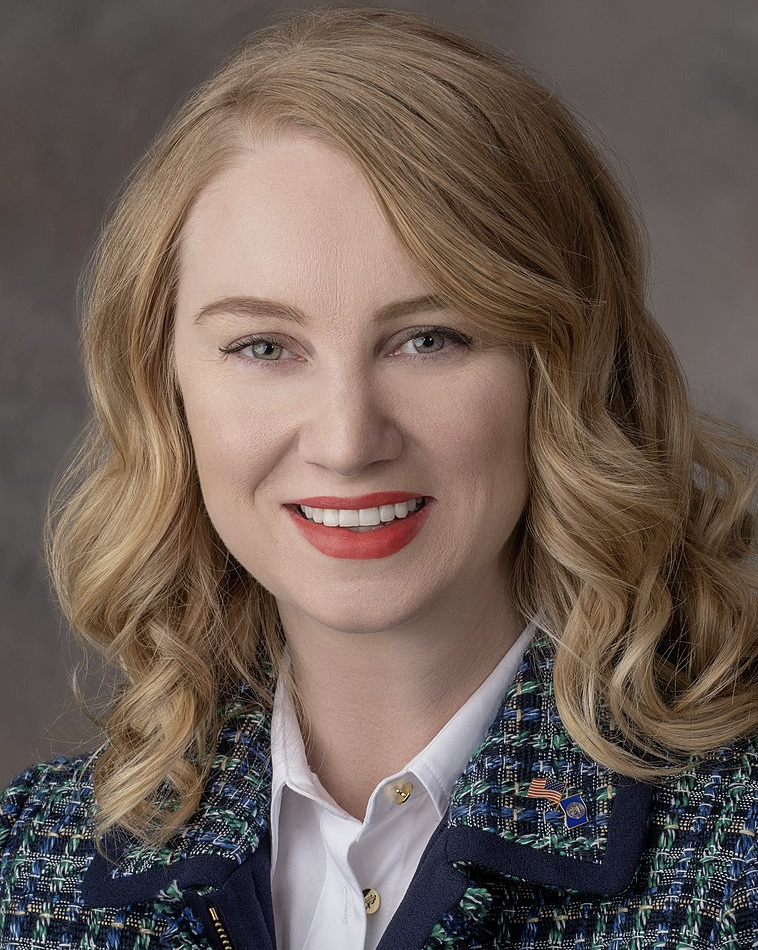
On this date in 1986, political activist and entrepreneur Megan Catherine Hunt was born in Blair, Neb., to Mary Beth (née Arts) and Dan Hunt, respectively a homemaker and president of a telecommunications supply company. Her parents “instilled in her the value of hard work, determination, and the importance of public service.” She was raised Catholic. (meganfornebraska.com)
She started attending Dana College in Blair during her senior year of high school as a Presidential Scholar. After earning a B.A. in intercultural communication and German in 2008, she enrolled in the University of Nebraska-Omaha’s political communication master’s program and coached Blair High School forensics for four years.
Hunt founded Hello Holiday, a boutique and e-commerce company supporting independent fashion designers. It was known for its “Girls Support Girls” messaging and fundraising collaborations with local nonprofits. She decided to run for office after she got involved in a grassroots effort to update the sex education curriculum in Omaha Public Schools in 2015.
She won election in 2018 to Nebraska’s 49-member unicameral legislature with 64% of the vote in an Omaha district. Legislators are called senator, serve without party affiliation or caucuses and make $12,000 plus per diem annually. Senators are limited to two consecutive terms. She was reelected in 2022 by a margin of 69% to 31%. An opponent during the primary season who worked at A Latere Academy, a Christian home-school program, called herself a “Bible-believing Christian” on her campaign site.
Hunt said she broke barriers as the first “out” LGBTQ+ state senator, as a single working parent and as an atheist. “I was really afraid that my colleagues would stereotype me or be hostile toward me because of who I am, but I was wrong. I have found every one of my colleagues amenable, willing to work with me, and I have made several close friends with colleagues who are ideologically very different from me.” (State Innovation Exchange, Jan. 28, 2021)
She describes herself as being on the “far left” of the political spectrum and led a filibuster in April 2022 to defeat a draconian anti-abortion bill. She was among the key opponents of a bill to give full tax credit on donations to private school scholarships, citing the number of religious schools that would benefit, including schools that discriminate against LGBTQ+ youth. “It’s not appropriate for public money, tax dollars, to fund that type of bigotry and discrimination,” Hunt said. (KMTV, Jan. 12, 2022)
In an October 2022 OnlySky interview, she said she’s “a public servant who happens to be an atheist, not a lawmaker who wants to use her platform to promote her personal views.” She wants more emphasis on candidate recruitment and building a pipeline of people who are rational, reasonable and evidence-focused. “Representatives who can actually understand what normal people go through and who aren’t running for office just because they’re motivated by some extremist view or some conspiracy theory, because that’s what we’re seeing more and more nationwide.”
After closing Hello Holiday in 2019, Hunt’s inner entrepreneur kicked in a year later when she, working with her son Ash, started Five Nine, a specialty shop that sells stationery, home goods and practical art built on a belief in the beauty of everyday objects.
She was the recipient in 2022 of an FFRF Champion of the First Amendment award, which she accepted at the national convention in San Antonio. Her mentor, former Sen. Ernie Chambers, received the award in 2006. She publicly called the abortion ban a “church bill” sponsored by Christian religious extremists. “Her impassioned remarks and filibustering were credited with helping to kill the bill. Thanks to her activism, abortion is still legal in Nebraska,” FFRF said.
“I’ve never been a person of faith, so it wasn’t a big deal for me to just be who I am.”
— Hunt, commenting on FFRF's "Ask an Atheist" about making her nonbelief public (May 4, 2022)
Stephen Girard
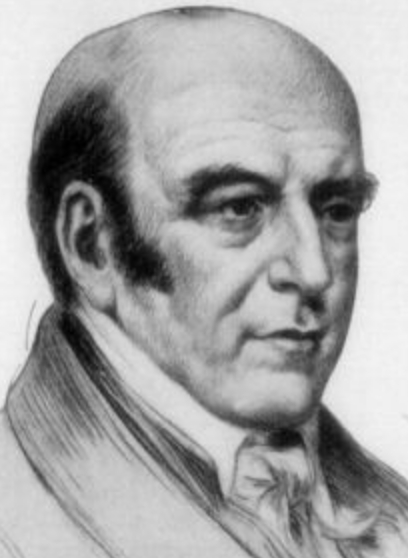
On this date in 1750, Stephen Girard was born in Bordeaux, France. The freethinking philanthropist, who settled in Philadelphia in 1776, liked to say he started life with a sixpence. When he died he was the wealthiest man in America.
Girard went to sea as a cabin boy before he was 14 and worked his way up to commander. He opened a store in his adopted city, then became a ship owner and banker. During the yellow fever outbreak in 1793, when half the residents fled, Girard became a hero. He not only opened his pocketbook to help but volunteered as nurse and hospital manager for two months, working directly with the sick and dying.
Girard, an arch-critic of clergy and Christianity, though he donated to individual churches, named his sailing ships after freethinkers such as Voltaire. Biographer Stephen Simpson wrote that “his opinions were atheistical” and that Girard “utterly disbelieved in all modes of a future existence, and who rejected with inward contempt every formulary of religion, as idle, vain, and unmeaning.”
He left nearly his entire estate, valued at $7.5 million, to charity. He willed more than $5 million for the construction and endowment of a college for orphans, instructing that there should be no sectarian control or instruction (see quote below). Writing in 1894 in Four Hundred Years of Freethought, Samuel Putnam noted the school had about 1,500 students but that Girard’s provisions had been “shamefully violated.” (D. 1831)
"I enjoin and require that no ecclesiastic, missionary, or minister of any sect whatever shall ever hold or exercise any station or duty whatever in the said college; nor shall any such person ever be admitted for any purpose, or as a visitor, within the premises appropriated to the purpose of the said college."
— Girard's bequest terms in endowing a college for orphans, "Biography of Stephen Girard, with his Will Affixed" by Stephen Simpson (1832)
Steve Wozniak
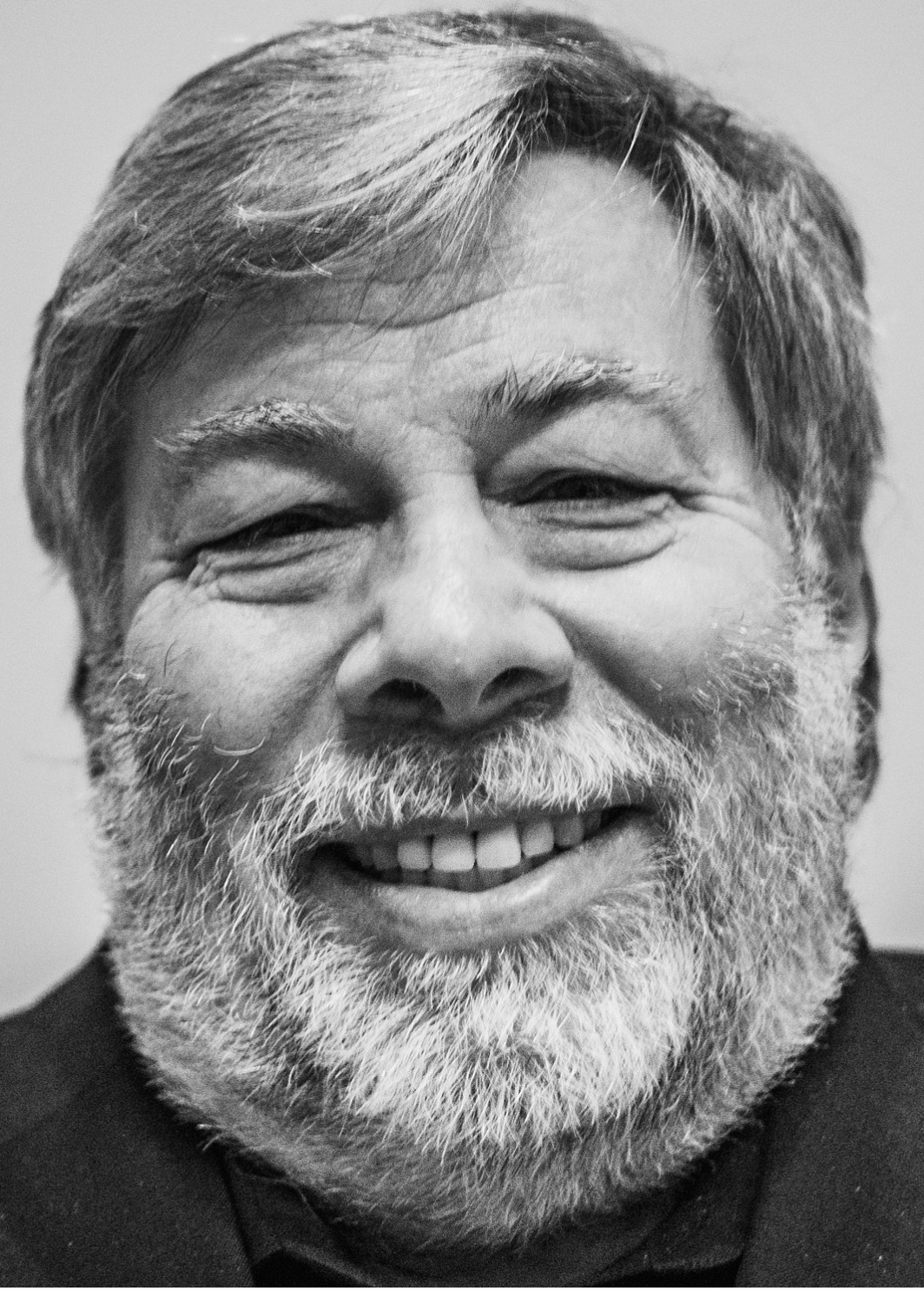
On this date in 1950, Stephen Gary Wozniak was born in San Jose, Calif. He holds degrees in electrical engineering and computer science from the University of California at Berkeley. Wozniak, aka “the wonderful wizard of Woz,” along with inventor Steve Jobs founded Apple Computer Inc. in 1976. He helped to create the original Apple computers, Apple I and Apple II, which were some of the first personal computers invented.
He left Apple employment in 1985 to found a company called CL 9, which brought the first programmable universal remote to market in 1987. He then pursued several other business and philanthropic ventures, focusing largely on technology in K–12 schools. After leaving Apple, he continued to have a relationship with the company and to represent it on certain occasions.
In 1985 he was given the prestigious National Medal of Technology by President Ronald Reagan. He received the 2001 Heinz Award for Technology, among numerous accomplishments. Wozniak is the founder of the Electronic Frontier Foundation, a nonprofit digital rights organization, and is a New York Times best-selling author for his autobiography, iWoz: From Computer Geek to Cult Icon (2006). He has three children from his marriage to Candice Clark, the second of his four wives.
Besides being a freethinker himself, Wozniak said on his website that he “believes in encouraging free thinking and creativity for youngsters” (2009). He was awarded the 2011 Isaac Asimov Science Award from the American Humanist Association.
PHOTO: Wozniak in 2018; Michael Förtsch photo under CC 4.0.
“I am also atheist or agnostic (I don’t even know the difference). I’ve never been to church and prefer to think for myself."
— Wozniak, "Letters-General Questions Answered," Woz.org (Nov. 4, 2012)
George Soros

On this date in 1930, George Soros (né György Schwartz), entrepreneur, philanthropist and social activist, was born to upper-middle-class, nonobservant Jewish parents in Budapest, Hungary. The family changed its surname to Soros in 1936 because Jews were being persecuted. He lived through the Nazi occupation that resulted in the murder of over 500,000 Hungarian Jews and posed as a teen as Christian to escape detection.
After the establishment of a communist government under Soviet hegemony after World War II, he fled to England in 1947 to attend the London School of Economics, where he earned bachelor’s and advanced degrees in philosophy.
He worked for a merchant bank in London before emigrating in 1956 to New York City, where he began working in finance and investment and securities analysis. He developed the theory of reflexivity, which posits that market values are driven by the fallible ideas of participants as well as economic fundamentals. He launched the Soros Fund Management in 1970, a hedge fund that eventually made him a multi-billionaire.
He started the Open Society Foundations in 1979, supporting democracy, human rights and economic development in over 120 countries. In 2017 he announced he had transferred $18 billion of his fortune into an endowment to fund future work of the Foundations, bringing his total giving to the Foundations since 1984 to over $32 billion. He has also heavily supported liberal and progressive causes and political candidates, making him a convenient target for conservatives and the Religious Right.
Soros has written 14 books, including Underwriting Democracy (1991), The Bubble of American Supremacy: Correcting the Misuse of American Power (2004), The Crash of 2008 and What it Means (2009) and The Tragedy of the European Union: Disintegration or Revival? (2014). Soros was twice divorced with five children when he married Tamiko Bolton in 2013, a Japanese-American businesswoman 42 years his junior.
Among the FAQs (frequently asked questions) on his website is “What faith is George Soros?” It’s answered like this: “He identifies himself as an atheist.” About his views on religion: Soros “respects all faiths and religious practices. He believes that people of faith and faith communities contribute to the public’s understanding of pressing social issues and often add a principled, moral aspect to debates that are too often dominated by politicians, statistics and polling.”
PHOTO: Soros in 2011 in Munich, Germany; Harald Dettenborn photo.
STEVE KROFT: Are you religious?
GEORGE SOROS: No.
KROFT: Do you believe in God?
SOROS: No.— Interview on CBS "60 Minutes" (Dec. 20, 1998)
Bill Gates (Quote)

"Just in terms of allocation of time resources, religion is not very efficient. There's a lot more I could be doing on a Sunday morning."
— Time magazine interview with Gates, the principal founder of Microsoft (Jan. 13, 1996)
Scott Galloway
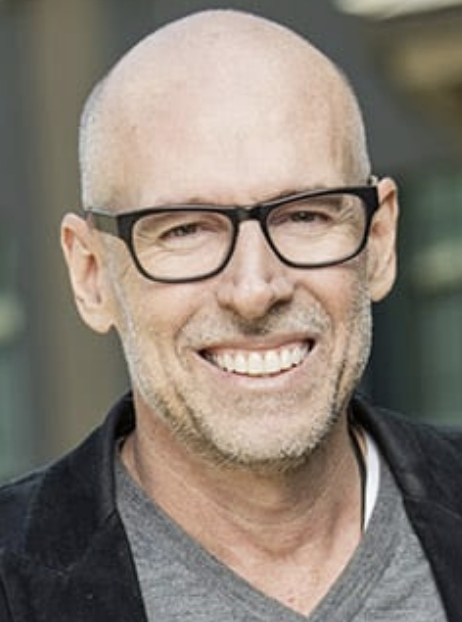
On this date in 1964, marketing professor and entrepreneur Scott Galloway was born in New York City. He grew up in California. In a post on his blog No Mercy / No Malice (June 11, 2018), he wrote: “Religion has played almost no role in my life. My parents weren’t religious, and I had no exposure to God until, at age seven, a babysitter told me I had to stand in the corner with my arms raised (like Jesus?) whenever I said “God” in a blasphemous manner (i.e., ever).”
After his parents divorced, he occasionally attended a synagogue with his mother and felt like he “fit in” with westernized Judaism. He accompanied his stepmother to Presbyterian services on some weekend visits to his father’s.
Galloway earned a B.A. in economics in 1987 from the University of California-Berkeley and an M.A. in economics from UCLA in 1992. He worked as a Morgan Stanley fixed income analyst from 1987-89. In 1997 he founded Red Envelope, an early e-commerce site. He started the digital intelligence firm L2, Inc. in 2009. It was acquired in 2017 by the tech research firm Gartner for $155 million.
From 2002 until this writing in 2022, Galloway has been a clinical professor of marketing at New York University’s Stern School of Business, teaching brand strategy, digital marketing and luxury marketing to second-year MBA students and researching emerging technology platforms. He and his wife Beata, a property developer from Germany, have two sons.
He made a $4.4 million gift to UC-Berkeley’s business school in 2017 to fund fellowships for undergraduate and graduate students who come from immigrant families. It was the school’s second-largest gift ever from an MBA alumni.
He has served on the board of directors of Eddie Bauer, The New York Times Company, Gateway Computer, Urban Outfitters and Berkeley’s Haas School of Business. Galloway’s public presentations and TED-style talks called “Winners & Losers” draw wide audiences. His 2019 book “The Algebra of Happiness: Notes on the Pursuit of Success, Love, and Meaning” puts in print some of those ideas.
He has repeatedly called for antitrust intervention to break up Apple, Facebook, Amazon and Google, endorsed Michael Bloomberg’s presidential 2020 candidacy and sought the removal of Twitter CEO Jack Dorsey. At the time, Galloway owned over 330,000 shares of Twitter stock.
“Most agnostics are closeted atheists,” declared Galloway in a 2018 blog. “I don’t know when exactly I turned off religion. My belief, similar to Ricky Gervais’s, is that good people do good things, bad people do bad things, and when you find good people doing really bad things, religion is usually involved. Finding atheism for me was significant, as I learned the core of atheism is not a denial of God, but an acceptance and tolerance of others’ beliefs, including those of us who don’t believe.”
“Similar to 44% of Americans who at some point change their religious status, I pinged from Jewish to agnostic to atheist. Truth is I was never an agnostic, but an atheist, and didn't have confidence to admit it.”
— No Mercy / No Malice blog, "What Is Heaven?" (June 11, 2018)
Andrew Carnegie
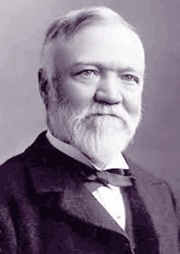
On this date in 1835, tycoon turned philanthropist Andrew Carnegie was born in Dumfermline, Scotland. In 1848 he traveled with his family to Allegheny, Pa. He entered the workforce at 13 as a bobbin boy in a cotton mill, worked at Western Union and the Pennsylvania Railroad, then founded the Keystone Bridge Works and the Union Iron Works in Pittsburgh. In his book The Gospel of Wealth (1899), he proposed that the rich are obligated to give away their fortunes.
He began his philanthropy in his 30s, first endowing his native town, and eventually establishing seven philanthropic and educational corporations. His principal desire was to promote free public libraries. When he started that campaign in 1881, they were scarce in the U.S. His $56 million built 2,509 libraries. By the time of his death he had given away more than $350 million.
Carnegie rejected Christianity and sectarianism and was delighted to replace those views with evolution: “Not only had I got rid of the theology and the supernatural, but I had found the truth of evolution,” he wrote in his 1920 autobiography, published the year after his death. After encountering missionaries on a voyage to the Pacific, Carnegie wrote humorously in his diary that he would “never forgive” the missionary for a particularly ridiculous sermon. When applied to for money by those same missionaries to China, Carnegie wrote them: “I think that money spent upon foreign missions for China is not only money misspent, but that we do a grievous wrong to the Chinese by trying to force our religion upon them against their wishes.” (Carnegie to Ella J. Newton, Foochow, China, Nov. 26, 1895)
His attitude toward religion softened later in life when he attended a Presbyterian church pastored by Social Gospel exponent Henry Sloane Coffin and had a brief correspondence with the eldest son of the founder of the Bahá’í faith.
He did not want to marry during his mother’s lifetime. After she died in 1886, the 51-year-old Carnegie married Louise Whitfield, 21 years his junior. They had their only child in 1897, a daughter named after his mother Margaret. He died at age 83 of bronchial pneumonia at his estate in Lenox, Mass. (D. 1919)
"The whole scheme of Christian Salvation is diabolical as revealed by the creeds. An angry God, imagine such a creator of the universe. Angry at what he knew was coming and was himself responsible for. Then he sets himself about to beget a son, in order that the child should beg him to forgive the Sinner. This however he cannot or will not do. He must punish somebody — so the son offers himself up & our creator punishes the innocent youth, never heard of before — for the guilty and became reconciled to us. … I decline to accept Salvation from such a fiend."
— 1905 Carnegie letter to Sir James Donaldson of St. Andrews University, cited by Joseph Frazier Wall in "Andrew Carnegie" (1970)
Kerry Packer
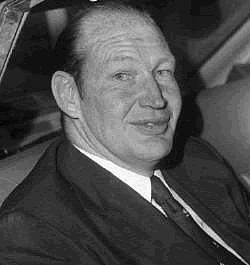
On this date in 1937, business tycoon Kerry Francis Bullmore Packer was born in Sydney, Australia. His father was the wealthy Sir Frank Packer, an influential figure in publishing and broadcasting. After his father’s death in 1974, Packer inherited his media holdings and became head of the Australian Consolidated Press (1974–2005), chairman of Publishing and Broadcasting Limited and owner of Channel Nine.
In 1977 he founded World Series Cricket, an independent cricket competition televised on Channel Nine, which provided higher salaries for players and changed the way cricket was played for television. He married Roslyn Redman Weedon in 1963 and they had two children, James and Gretel.
In 1990, during the Australian Open polo championship, he suffered the first of several heart attacks and was left clinically dead for six minutes before being revived. “Believe me, there is nothing on the other side. I’ve been there,” Packer said of his experience (quoted in a BBC News story on Dec. 27, 2005). He then paid to furnish every ambulance in New South Wales with portable defibrillators, which soon became known as Packerwhackers.
He died of kidney failure nine days after his 68th birthday. He had instructed his doctors not to prolong his life with dialysis and that he wanted to “die with dignity.” His private funeral service was held at his country estate. (D. 2005)
"The good news is there's no devil. The bad news is there's no heaven. There's nothing."
— Packer, speaking about the time he spent clinically dead, quoted in his Reuters obituary (Dec. 27, 2005)
